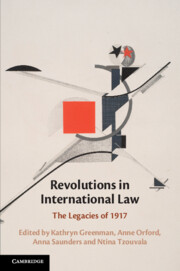Book contents
- Revolutions in International Law
- Revolutions in International Law
- Copyright page
- Contents
- Notes on Contributors
- Acknowledgements
- 1 International Law and Revolution
- Part I Imperialism
- Part II Institutions and Orders
- 4 Excluding Revolutionary States
- 5 Law, Class Struggle and Nervous Breakdowns
- 6 Microcosm
- 7 Law and Socialist Revolution
- Part III Intervention
- Part IV Investment
- Part V Rights
- Index
4 - Excluding Revolutionary States
Mexico, Russia and the League of Nations
from Part II - Institutions and Orders
Published online by Cambridge University Press: 21 January 2021
- Revolutions in International Law
- Revolutions in International Law
- Copyright page
- Contents
- Notes on Contributors
- Acknowledgements
- 1 International Law and Revolution
- Part I Imperialism
- Part II Institutions and Orders
- 4 Excluding Revolutionary States
- 5 Law, Class Struggle and Nervous Breakdowns
- 6 Microcosm
- 7 Law and Socialist Revolution
- Part III Intervention
- Part IV Investment
- Part V Rights
- Index
Summary
With these phrases the president spoke of the Allied Powers’ plan to establish a new organisation – one based on the principles of universality and freedom. Nevertheless, while this association would not ‘shut out anybody’, it was clear that the terms of its creation would be dictated by a limited group – the delegates of the states who would constitute the Commission on the League of Nations. Of course, the leaders who heard this address on 18 January 1919 were by no means representative of the international community. The most notable absences were the former enemy powers, but there were others not present at the meeting in Paris, including Russia and Mexico. While the absence of the former was keenly felt by the Allied Powers, and the ‘Russian question’ was the subject of much discussion, the lack of an invitation to Mexico, as a neutral power, did not excite the same interest, at least in the formal discussions.2
- Type
- Chapter
- Information
- Revolutions in International LawThe Legacies of 1917, pp. 85 - 111Publisher: Cambridge University PressPrint publication year: 2021



